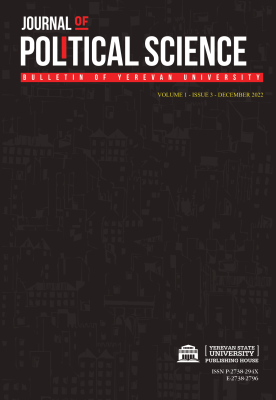Werther-Pietsch, Ursula. 2022. Transforming Security: A New Balance-of-Power Doctrine (Global Power Shift Series). Springer, Cham. XXII, 180 pp. https://doi.org/10.1007/978-3-030-87097-3
DOI:
https://doi.org/10.46991/JOPS/2022.1.3.095Keywords:
international security, balance-of-power doctrine, politics of equidistance, international intervention logics, collaborative regional orders, strategic autonomy, multilateral system thinking, anticipatory governance, two-track peacekeeping, UN framework, collective security, international law of peace and securityAbstract
The modern system of international security and the doctrine of the balance of power is going through a difficult period of exacerbation of geopolitical contradictions associated with a new redistribution of zones of influence. As a result of these processes, a significant increase in instability is observed in many regions, which actualizes the problem of the military security of states. Despite the global transformations of the world system, the potential of military force is still considered one of the most effective factors in world politics.
The emergence of new technologies of confrontation, the expansion of the range of possibilities for destructive influence through peaceful means, primarily of an informational nature, require revision and modernization of the UN security system. It is necessary to take measures to counter threats of an information nature, the object of which is both military infrastructure and public consciousness. In connection with the emergence of a new information reality, the study of the specifics of the military security system of modern countries is of great civilized significance.
Since 2014, the UN structure and collective security have faced serious geopolitical challenges and threats due to the revival of its key role in the system of international relations, its desire to restore the international law of peace and security. Obviously, in the conditions of the new reality in modern wars, preference is given to both military and non-military technologies, the parallel use of which has a powerful destructive potential for communicative and informational impact on public consciousness, carried out with the help of cyberspace, social networks, the media and the Internet. Because of this, geopolitical actors today prefer hybrid methods of war, as well as the widespread use of information technology capabilities to inflict damage on the enemy. In this context, the totality of modern geopolitical challenges and threats in the new information reality can be characterized as a hybrid war, which includes a wide range of actions aimed at destroying all spheres of the rival country’s social life.
References
Werther-Pietsch, Ursula. 2022. Intertwined Pillars in a World of Change. In: Transforming Security: A New Balance-of-Power Doctrine (Global Power Shift Series), 9-22. Springer, Cham. https://doi.org/10.1007/978-3-030-87097-3_2.
Werther-Pietsch, Ursula. 2022. New Ways to Tackle Global Peace and Security. In: Transforming Security: A New Balance-of-Power Doctrine (Global Power Shift Series), 23-41. Springer, Cham. https://doi.org/10.1007/978-3-030-87097-3_3.
Werther-Pietsch, Ursula. 2022. Who, Why and When - The Normative Framework. In: Transforming Security: A New Balance-of-Power Doctrine (Global Power Shift Series), 43-63. Springer, Cham. https://doi.org/10.1007/978-3-030-87097-3_4.
Werther-Pietsch, Ursula. 2022. How To Do It - Strategies of Intervention. In: Transforming Security: A New Balance-of-Power Doctrine (Global Power Shift Series), 65-85. Springer, Cham. https://doi.org/10.1007/978-3-030-87097-3_5.
Werther-Pietsch, Ursula. 2022. Changed Geopolitical Framework. In: Transforming Security: A New Balance-of-Power Doctrine (Global Power Shift Series), 89-100. Springer, Cham. https://doi.org/10.1007/978-3-030-87097-3_6.
Werther-Pietsch, Ursula. 2022. Dynamics and UN Reform from 1990 to 2030. In: Transforming Security: A New Balance-of-Power Doctrine (Global Power Shift Series), 101-122. Springer, Cham. https://doi.org/10.1007/978-3-030-87097-3_7.
Werther-Pietsch, Ursula. 2022. Learning from History. In: Transforming Security: A New Balance-of-Power Doctrine (Global Power Shift Series), 125-142. Springer, Cham. https://doi.org/10.1007/978-3-030-87097-3_8.
Werther-Pietsch, Ursula. 2022. Modelling the Future. In: Transforming Security: A New Balance-of-Power Doctrine (Global Power Shift Series), 143-167. Springer, Cham. https://doi.org/10.1007/978-3-030-87097-3_9.
Werther-Pietsch, Ursula. 2022. Reality Check: New Intervention Logic. In: Transforming Security: A New Balance-of-Power Doctrine (Global Power Shift Series), 169-172. Springer, Cham. https://doi.org/10.1007/978-3-030-87097-3_10.
Werther-Pietsch, Ursula. 2022. Multilateral System Thinking. In: Transforming Security: A New Balance-of-Power Doctrine (Global Power Shift Series), 173-175. Springer, Cham. https://doi.org/10.1007/978-3-030-87097-3_11.
Werther-Pietsch, Ursula. 2022. Global Peace Mechanism 2050 - Transforming Security. In: Transforming Security: A New Balance-of-Power Doctrine (Global Power Shift Series), 177-180. Springer, Cham. https://doi.org/10.1007/978-3-030-87097-3_12.
Downloads
Published
Issue
Section
License
Copyright (c) 2022 Haykuhi Mkrtchyan

This work is licensed under a Creative Commons Attribution-NonCommercial 4.0 International License.



